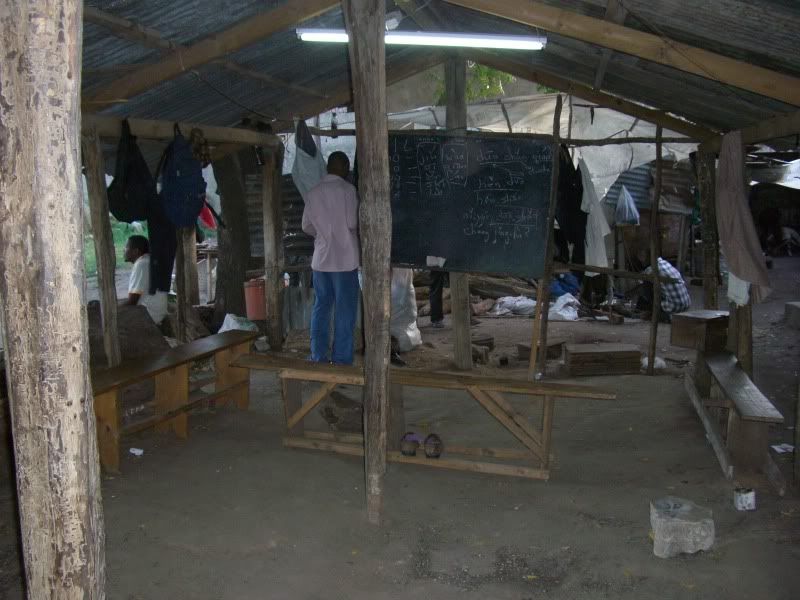
This is the classroom as it is being prepped for class. Usually during the day, workers using the roof as shade from the sun. At around 6 or so, they close up their work, and head out. Students then start trickling in as they finish up washing themselves and gathering their materials for class.
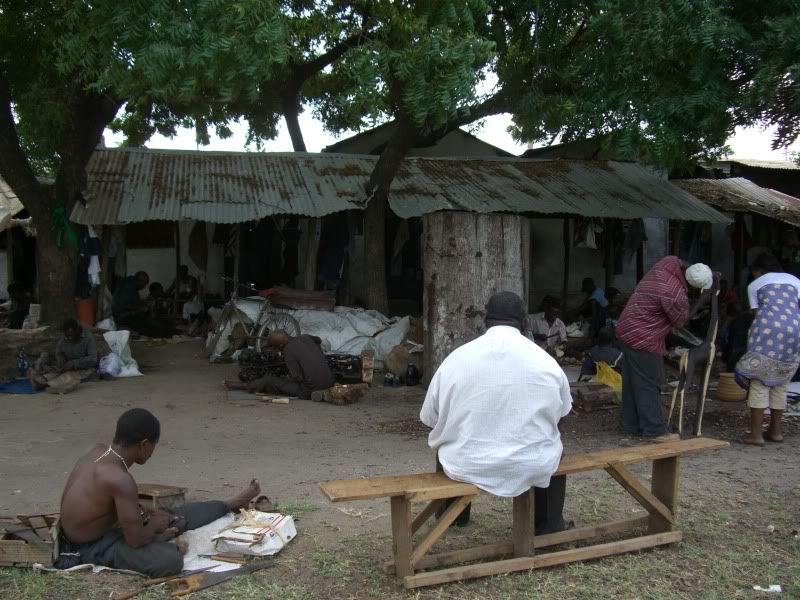
This is a view of the classroom from the side. As one can see, there are some workers under the roof working. This is what it usually looks like from the day. Sitting on the bench is the chairman and to his left on the floor is one of my students.
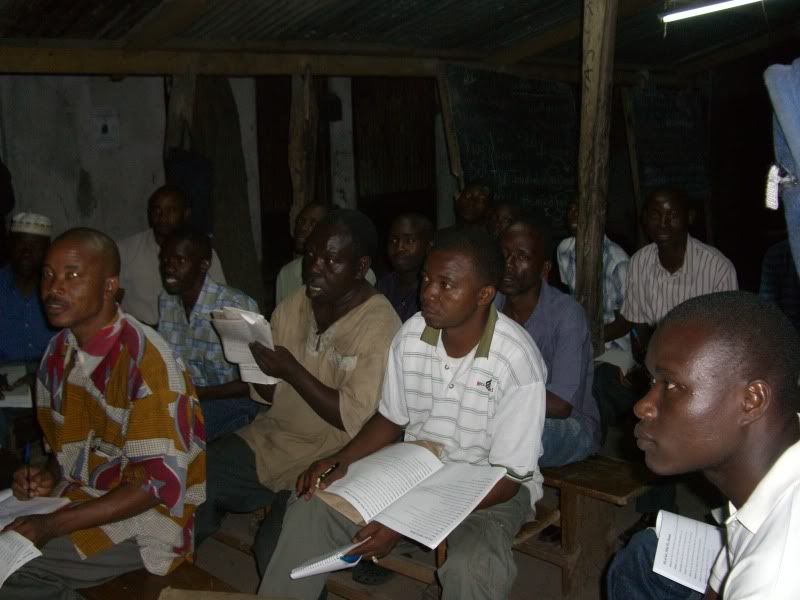
Here are my students working hard to understand what is going on. In their hands are the textbooks that I have created.
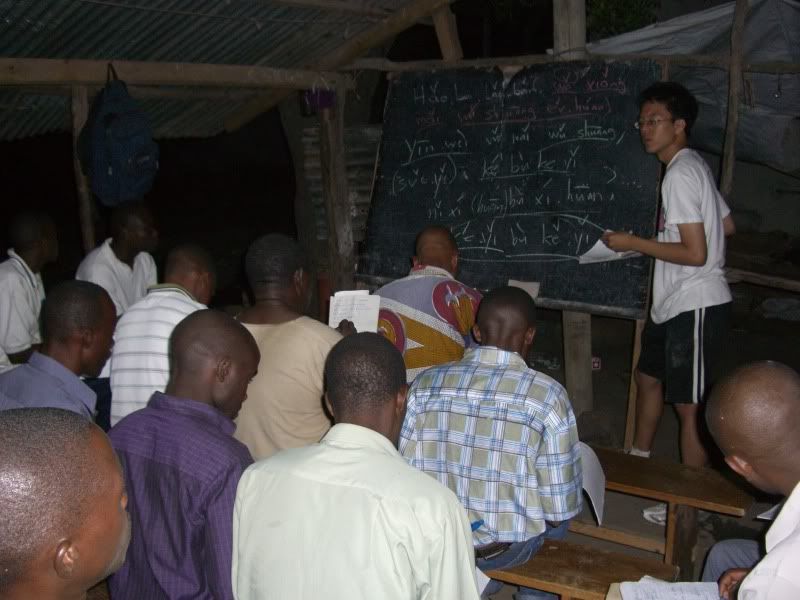
Here is a better shot of what the students are paying attention to. This lesson involves the important grammatical structure of 因为。。。所以。。。 (Kwa sababu... kwa hivyo... Because... therefore).
The Comedy:
The following pictures are taken when students were preparing for the comedy, to which some people of the Chinese Embassy attended. In total, we had 6 sections, and I will type up each skit and follow it with pictures:
Group #1 (Kikundi cha Kwanza):
Keflas: 先生,你好吗?你今天过地怎么样?请进!来看一看!(Sir, how are you? How are you today? Please come in, come take a look!)
Steven and Joseph: 我们有很多犀牛!(We have lots of rhinos!)
(Sebastian passing says "不要!" (I don't want it!), another group of Chinese speaking customers enters)
Kelfas: 欢迎光临!大家来看一看!(Welcome! Welcome! Everyone come take a look!)
Steven and Joseph: 我们有很多很大的犀牛!(We have lots of big rhinos!)
(Pius, Nampwahi, and Faustin pass saying "不要!" (don't want it). Lawrence enters as the final passerby-er)
Kelfas: 朋友!欢迎你来看一看我们的商品!(Friend! Welcome, take a look at my wares!)
Steven and Joseph: 我们有很多大的和很好的犀牛!(We have lots of big and great rhinos!)
Lawrence: 哎哟!你为什么一直叫,‘我有很多犀牛?’” (Aiyo! Why do you keep yelling, "I have lots of rhinos!)
Kelfas: 他们一直叫因为很多中国人很喜欢犀牛!(They keep yelling because lots of Chinese people like rhinos!)
Lawrence: 算了,我走了!(Forget it! I'm leaving!)
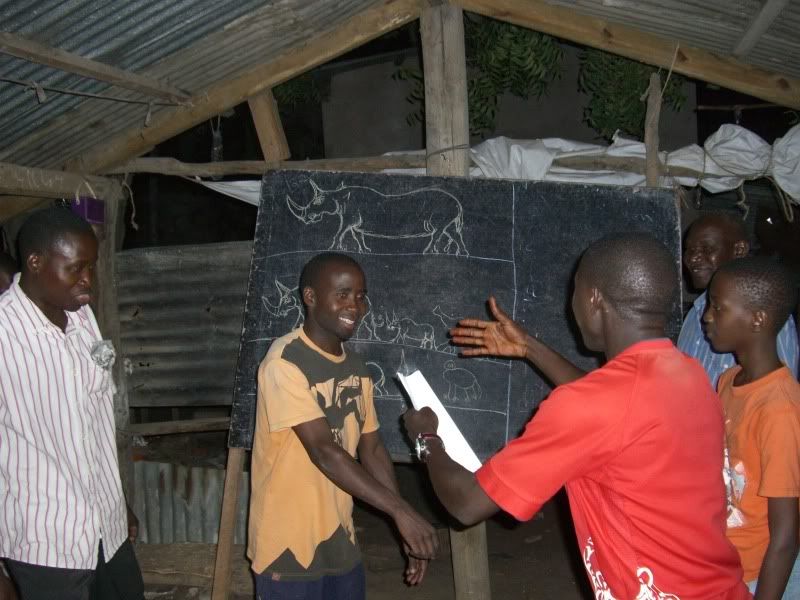
Here, storeowners Kelfas (red), Steven (orange), and Joseph (Blue) try futilely to invite a group of Chinese speaking customers, Pius (left), Nampwahi (right of Pius).
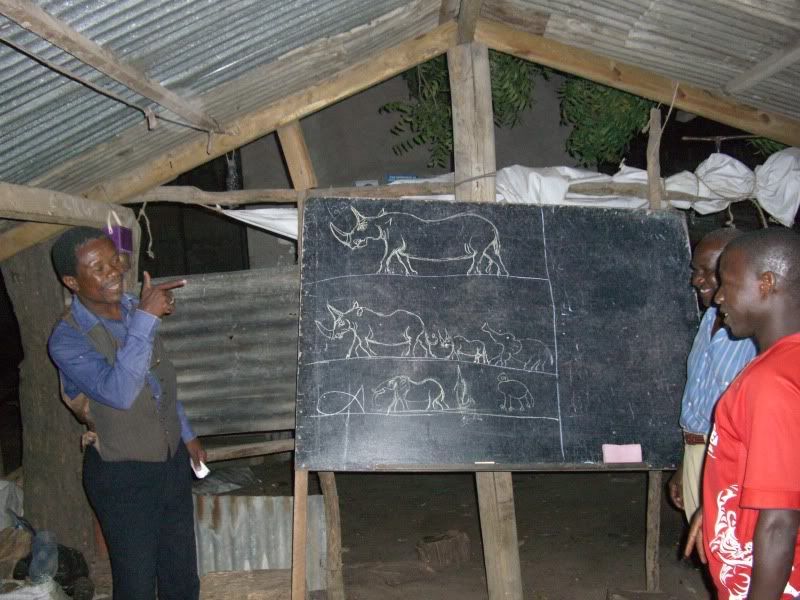
Here, Lawrence (left), wonders why Kelfas, Steven, and Joseph keep yelling "我们有很多犀牛!" (We have lots of rhinos!)
Group #2:
Njudi: 先生,欢迎,请进!(Sir, welcome, come in!)
Pius and Gerald: 谢谢!(Thank you!)
Njudi: 请问你们在找什么?(May I ask what you are looking for?)
Gerald: 我们在找犀牛。 你有没有犀牛?(We are looking for rhinos. Do you have rhinos?)
Njudi: 当然有!你在找大的还是小的犀牛呢?(Of course! Are you looking for a big or a little rhino?)
Gerald: 我们在找大的犀牛!(We are looking for big rhinos)
Njudi: 这个够大吗?(Is this big enough?)
Pius: 这个太小了。你有更大的吗?(This is too small! Do you have any bigger ones?)
Njudi: 当然有。这个够大吗?(Of course! Is this big enough?)
Pius: 这个还是太小。(This is still too small)
Njudi: 这个还是太小?真的吗?(This is still too small? Really?)
Pius: 真的!(Really!)
Njudi: 这个犀牛很大。 你觉得他够大吗?(This rhino is really big. Is it big enough?)
Pius: 当然不够!这些犀牛都那么小。开玩笑!(Of course not! All these rhinos are so small! Are you kidding me!?)
Njudi: 对不起。我没有更大的。(Sorry. I don't have any bigger ones)
Pius: 算了!我们走了!(Forget it! We're leaving!)
Njudi: 请再来!哎,今天生意真不好!(Please come again! Ai! Business really isn't good today)
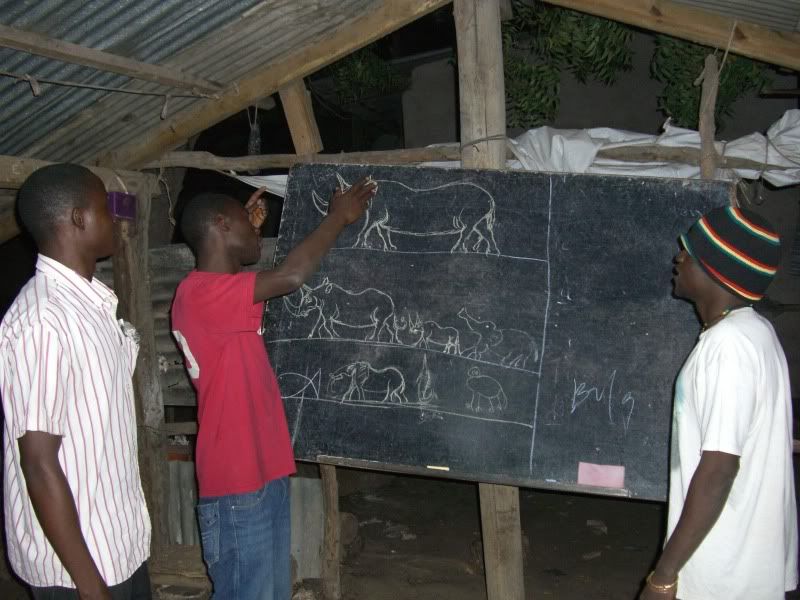
Here is Raphael telling Njudi about the big rhino that he wants.
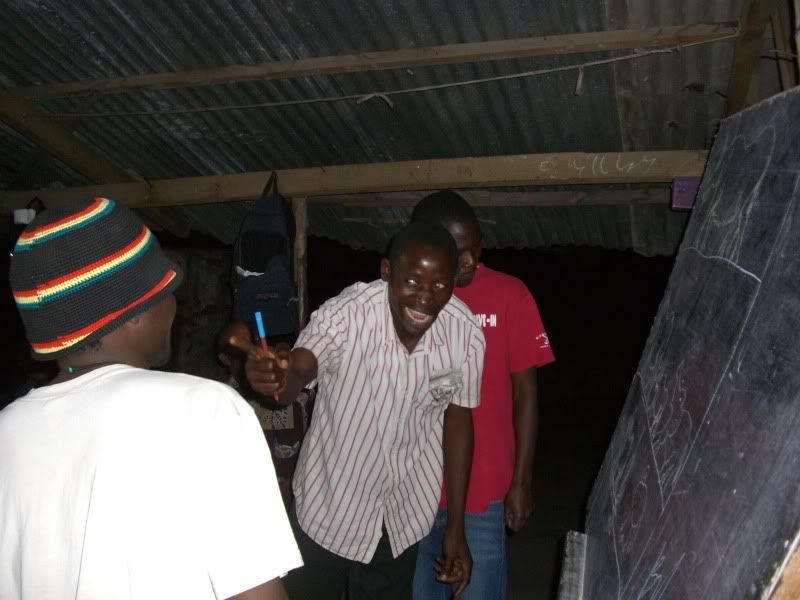
Pius is really unhappy with all the fact that Njudi only supplies small rhinos.
Group #3:
Gabriel: 诶! 朋友,请进,来看一看我的犀牛!(Hey! Friend! Come take a look at the rhinos!)
Nampwahi: 我门在找一个大的犀牛!(We are looking for one big rhino!)
Gabriel: 啊!大的犀牛。这个犀牛够大吗?(A big rhino? Is this rhino big enough?)
Nampwahi: 够大!这个要多少钱?(It is big enough. How much is this?)
Gabriel: 这个十万块!(This is 10,000 shillings!)
Sebastian: 十万块!不可能!太贵了!(10,000shillings!? It couldn't be. It's too expensive!)
Gabriel: 不贵!因为这个犀牛很好,所以要十万! (It's not expensive. Because this rhino is good, so it costs 10,000!)
Sebastian: 开玩笑!这个犀牛很不好!(You are kidding me! This rhino is not good!)
Gabriel: 那里很不好!这个犀牛质量特别高。你看,他的眼睛很漂亮。他的角很坚!(How is it not good? This rhino's quality is really high. Take a look, its' eyes are really pretty, its' horn is really sharp!
Sebastian: 可是我觉得这个犀牛很丑。(But I feel this rhino is ugly!)
Gabriel: 一点儿都不丑。这个犀牛又可爱,质量又很高!你为什么不喜欢它呢?(It's not ugly at all! This rhino is really cute, and its quality is high! Why do you not like it!?)
Sebastian: 因为他很丑!(Because it is ugly!)
Gabriel: 如果你觉得他很丑,那你为什么要买它呢?(If you think it is ugly, then why do you want to buy it?)
Sebastian and Nampwahi: 哎哟!算了,我走了!(Forget it! I'm leaving!)
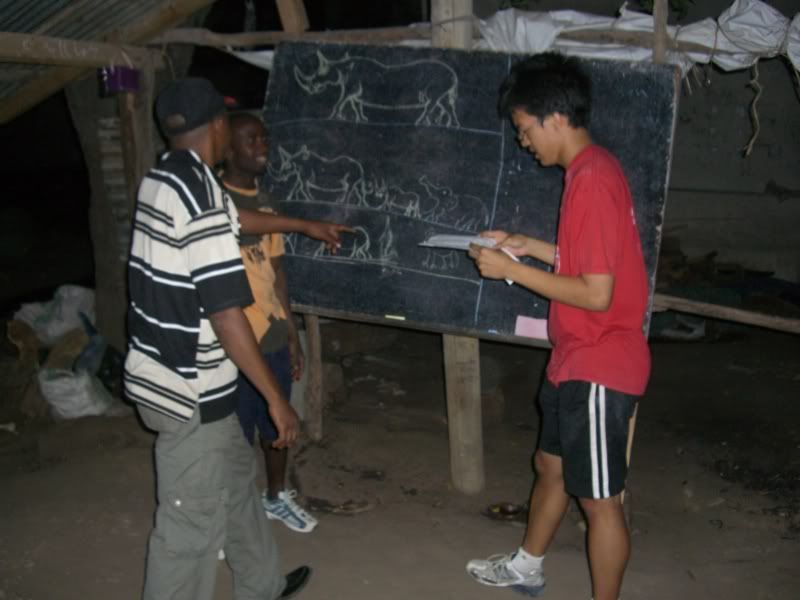
Unfortunately, for a week or so, Gabriel was missing so I had to take over. This means that the camera work is not quite great, as the students have rarely used cameras in their lives, but they are sufficient. Here Sebastian is telling me about how ugly the rhino is .
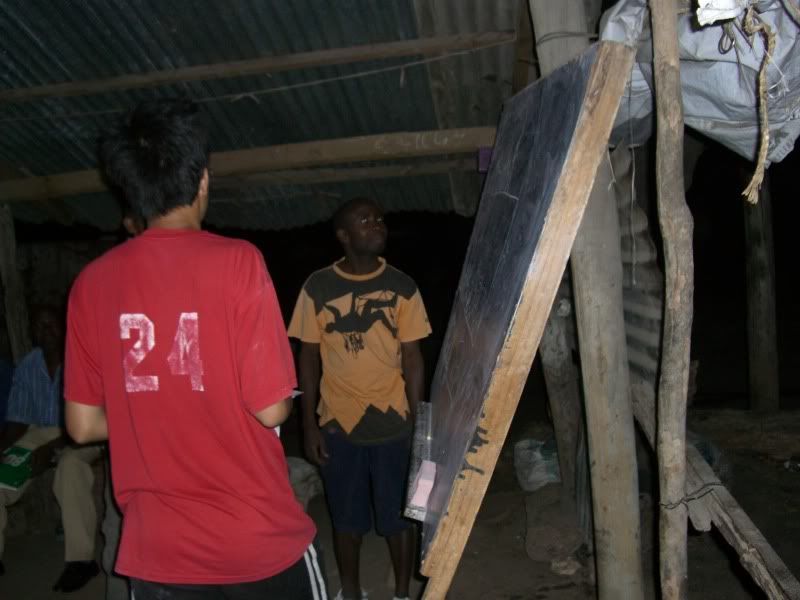
Nampwahi a bit shocked as to just how ugly the rhino is.
Group #4:
Yohana: 欢迎光临。请问你在找犀牛吗?(Welcome! Welcome! Are you looking for rhinos?)
Mchingawa: 是的。你怎么知道的?(Yes. How did you know?)
Yohana: 因为我有先见之明?(Because I have the ability to predict the future)
Mchingawa: 哇!太厉害了!这个犀牛多贵?(Wow! That's incredible! How much is this rhino?)
Yohana: 因为你是我的朋友,所以这个只要五万块!(Because you are my friend, so this is only 50,000 shillings!)
Faustin: 五万块!开玩笑!太贵了!五百块好了!(50,000 shillings! You're kidding me! It's too expensive. 500 shillings!)
Yohana: 朋友,连小的犀牛都要一万块。这么大的犀牛怎么可能五百块?(My friend, even a small rhino costs 10,000 shillings. How in the world could a rhino as big as this cost 500 shillings?)
Faustin: 那一万块,好了?(Then 10,000?)
Yohana: 朋友。你开我玩笑吧!(My friend. You've got to be kidding me!)
Hashim: 两万块!(20,000)
Yohana: 还是太便宜了!四万,好了! (It's still too cheap. 40,000!)
Faustin: 四万!? 我只有两万!(40,000! I only have 20,000!)
Yohana: 啊!两万块!那你只能买这个小的犀牛!(Ah! 20,000? Then you can only buy this small rhino.)
Faustin: 哎哟!算了,我走了!(Aiyo! Forget it! I'm leaving!)
Yohana: 哎! 今天生意真不好! (Ai! Business sure is no good today!)
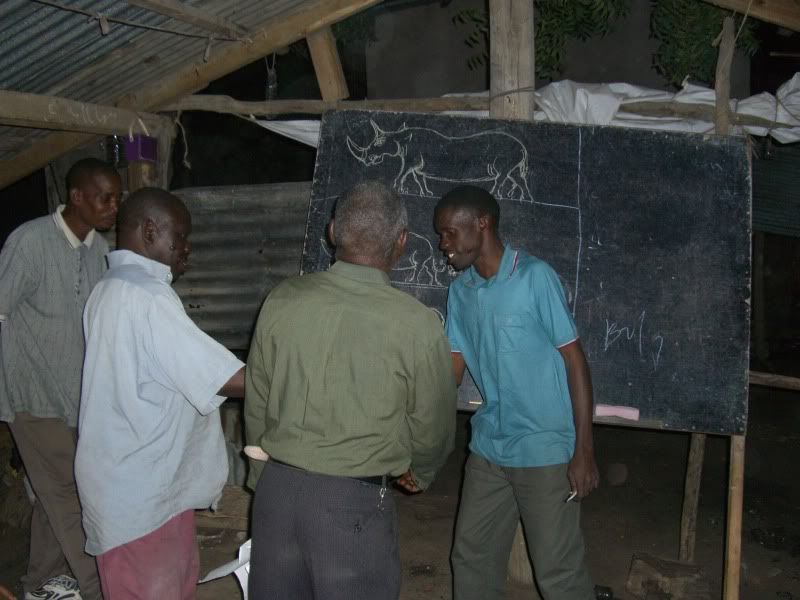
Yohana (right) greeting his customers Faustin, Hashim, and Mchingawa (from left to right).
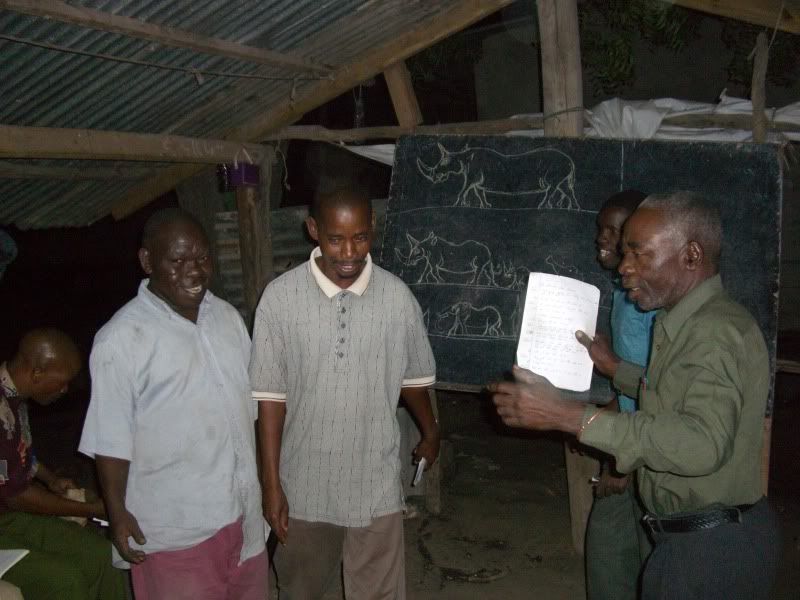
And the customers leave after being upset with the dialogue!
Group #5:
Peter: 先生, 这个多少钱?(Sir! How much is this?)
Amiry: 这个八万八千八百八十八块!(This is 88888 shillings)
Peter: 哇!那么贵!(Wow! That expensive?!)
Amiry: 虽然比较贵,可是很划算!(Though it is a little expensive, but it's worth it!)
Peter: 为什么?(Why?)
Amiry: 你看。有五个八, 所以你会发发发发发!不是很好吗?(Take a look. There are 5 eights, so you will get rich rich rich rich rich *This is a cultural note. Chinese like the number eight because it sounds close to the word for "get rich". This is what is going on here.)
Peter: 哎哟, 还是太贵了!四万四千四百四十四块好了?(Aiyo! It's still too expensive. 44444, ok?)
Amiry: 绝对不可以!(Absolutely not!)
Peter: 为什么?(Why?)
Amiry: 因为不能让你死死死死死!(Because I cannot let you die die die die die! *This is another cultural note. Chinese do not like the number four because it sounds like the word for death.)
Felix: 你还懂点中国文化!(You know a bit about Chinese culture!)
Amiry: 是的,因为我有中文老师,也上中文课,所以我懂一点儿。(Yes. Because I have a Chinese teacher, and go to Chinese class, so I know a little.)
Mpende: 啊!是吗?你的中文非常好。你是一个很好的学生!(Ah! Is that so? Your Chinese is really good! You are a good student!)
Amiry: 对啊!欢迎你们来看一看!(Yes! Welcome you to come again!)
Mpende: 好的。我明天再来!(Ok. I will come again!)
Amiry: 明天见!(See you tomorrow!)
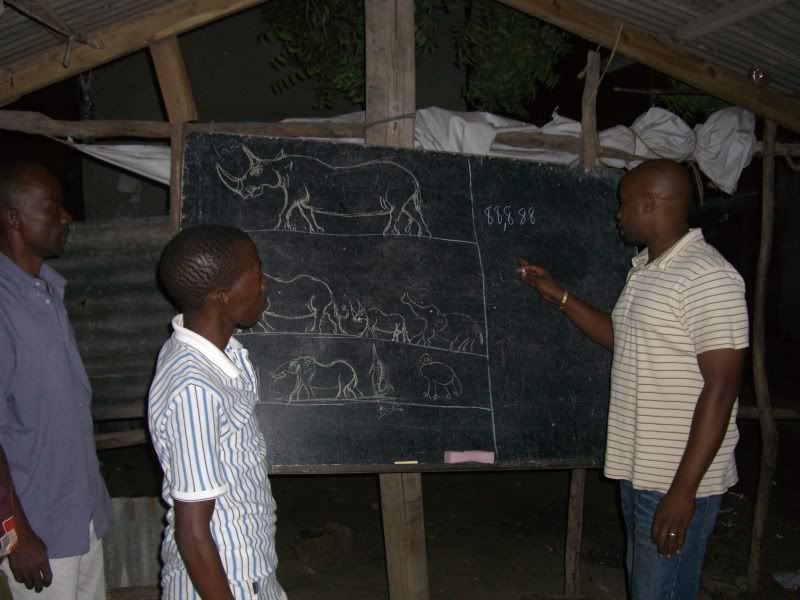
Here, Amiry (right) shows Felix (left) and Peter (middle) the importance of 8 in the Chinese language.
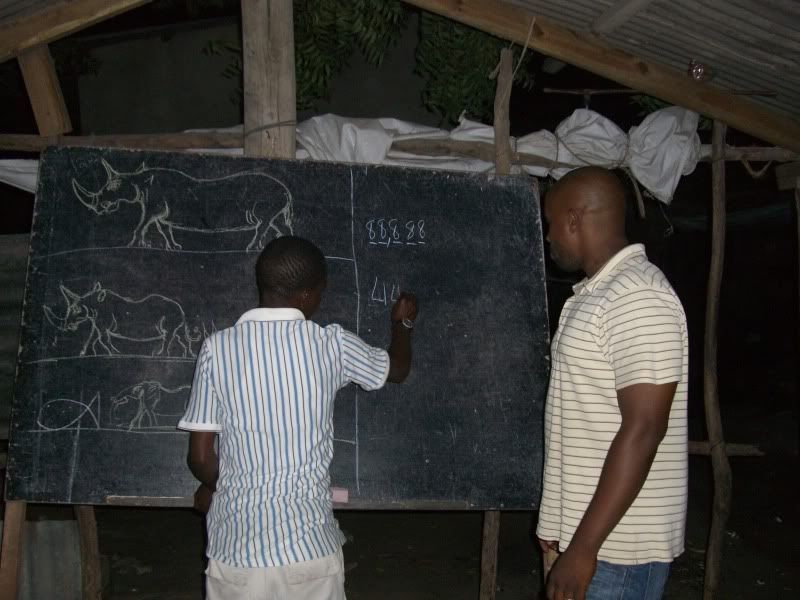
Peter, in response, shows Amiry what he thinks to be a fairer price.
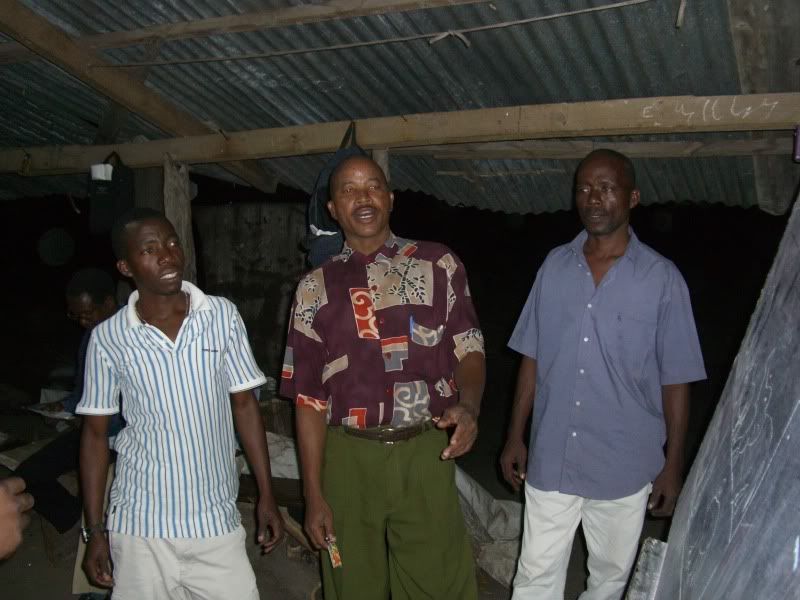
Mpende (middle) and Felix (right) compliment Amiry (not shown) on his fantastic Chinese cultural knowledge.
Group 6:
This group had two versions of conversation. One was before Ms. Wu decided to stop teaching, and one after she decided to stop teaching. I will post them both, though the students' lines did not change much:
Vincent: 你们好。(Hey guys!)
Saimoni and Gissi: 你好。(Hey)
Saimoni: Vincent, 你在找什么?(Vincent, what are you looking for?)
Vincent: 我在找中文老师。(I am looking for a Chinese teacher)
Saimoni: 诶!我们已经有一个中文老师啊!(Ei! We already have a Chinese teacher!)
Vincent: 是的,可是他走了以后,谁会教我们呢?(Yes, but after he leaves, who will teach us?)
Gissi: 这个是一个问题。我们去找找看吧!(This is a problem. Let's go search!)
(Students walk around in search of a teacher. At this time, Ms. Wu would enter)
Vincent: 你是不是中国人?(Are you a Chinese person?)
Ms. Wu: 是的。(Yes)
Vincent: 我们在找中文老师。 你有兴趣吗?(We are looking for a Chinese teacher. Are you interested?)
Ms. Wu: 有。你们在那里学中文?(Yes. Where do you guys learn Chinese?)
Saimoni: 在 Mwenge. 你可以教我们中文吗?(At Mwenge. Can you teach us Chinese?)
Ms. Wu: 当然可以。(Of course I can!)
Saimoni: 可是我们很穷,所以我们没有钱。(But we are poor, so we don't have money)
Ms Wu: 没有问题!(No problem)
Vincent: 好极了!请问你的贵姓?(Great! What is your family name?)
Ms. Wu: 我姓吴。(My family name is Wu)
All the students: 欢迎吴老师!!!(Welcome Teacher Wu!)
After Ms. Wu decided that she was too busy. The first half prior to the search stayed the same. The second half changed. Instead of Ms. Wu entering, another student, Kashmiry, entered first.
Vincent: 你是不是中国人?(Are you a Chinese person?)
Kashmiry:: 不是!! (No!!)
(At this point, I enter the classroom as just another Chinese person)
Vincent: 我们在找中文老师。 你有兴趣吗?(We are looking for a Chinese teacher. Are you interested?)
Me: 你们在那里学中文?(Where do you guys learn Chinese?)
Saimoni: 在 Mwenge. 你可以教我们中文吗?(At Mwenge. Can you teach us Chinese?)
Me: 也许可以。(Maybe I can)
Saimoni: 可是我们很穷,所以我们没有钱。(But we are poor, so we don't have money)
Me: 哎,对不起,那这个我就做不到。(Sorry, then this I cannot do)
(I leave the stage)
All the students: 唉!我们该怎么办!?(Ai! What should we do now?)
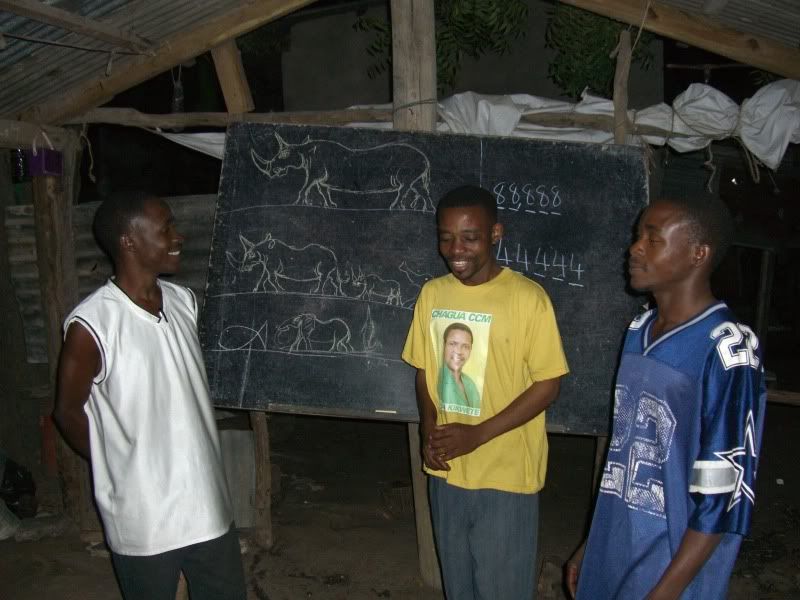
Vincent (left), Saimoni (middle), Gissi (right) discuss what needs to be done after their Chinese teacher leaves.
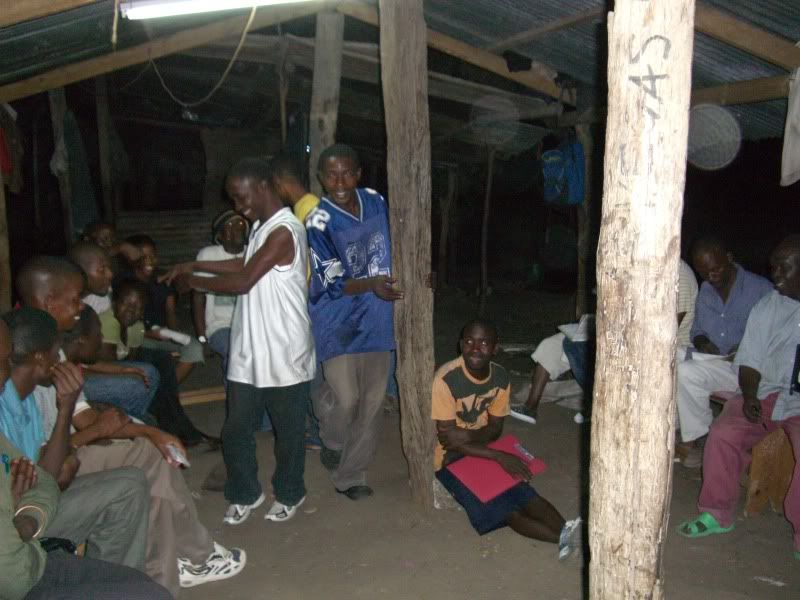
Vincent and Gissi on the search for a new teacher. Nampwahi looking at them as if they're crazy.
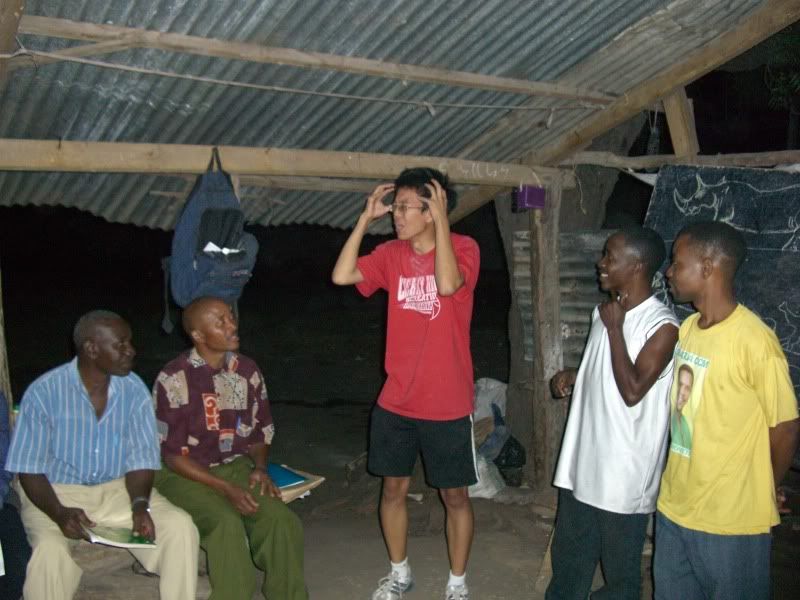
At times, I felt like a drama coach, instructing the students on some appropriate hand and arm movements. This gesture in particular went with the line: 唉!我们该怎么办! (Ai! What should we do now!?)
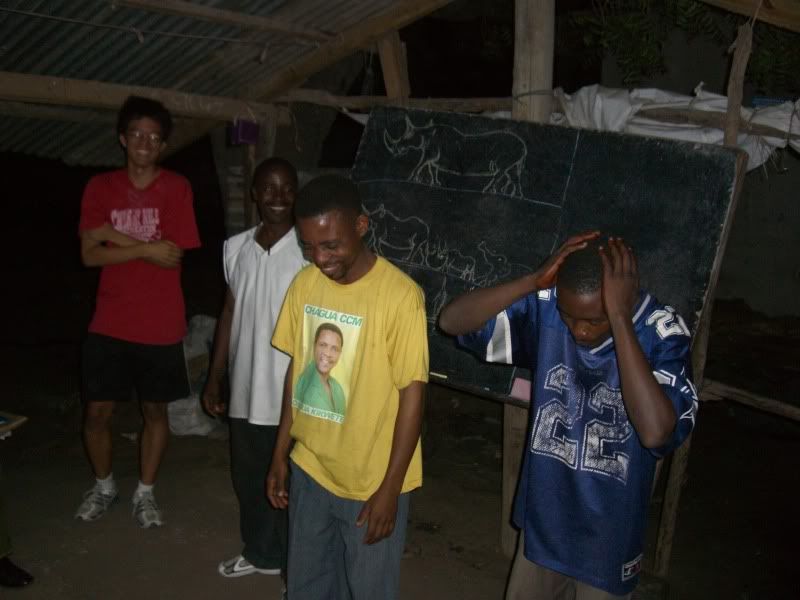
Gissi gives his best impersonation of me.
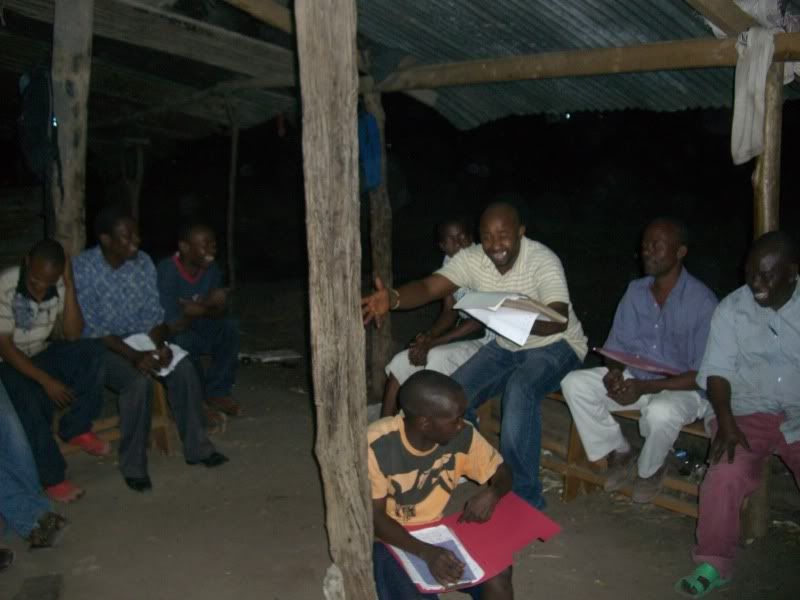
And here is Amiry getting a little too into the acting.
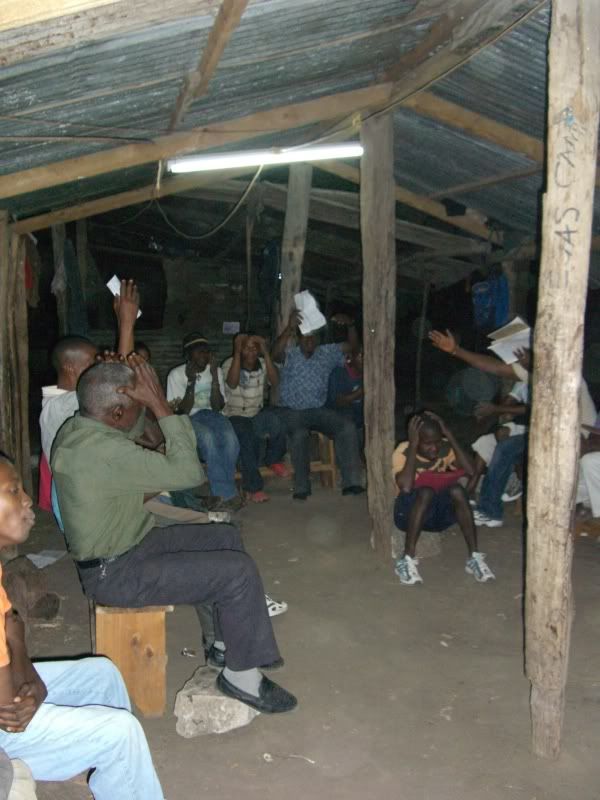
Everybody now!

This was party night. We actually had a lot more drinks under the table, but the ones on the table were for the guests of honor, the embassy members. I didn't actually take pictures of the embassy members once they got here (I should have) so this is all I have to show for it for now.
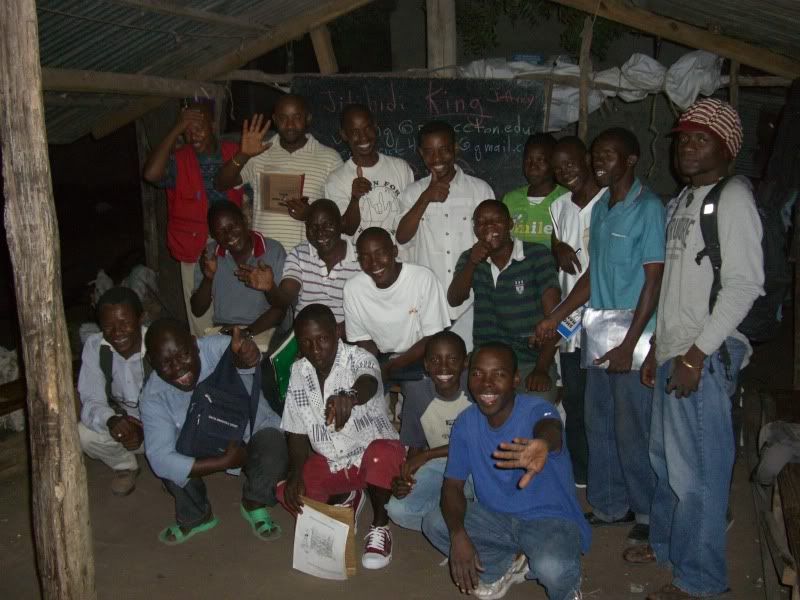
Here is a photo taken on the last day of class. Quite a few of the students are absent, so it is far from complete, but still, it's a very good one!